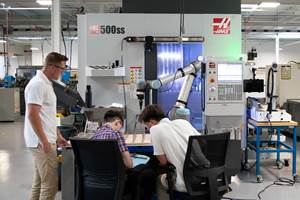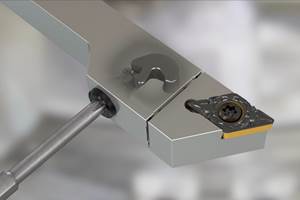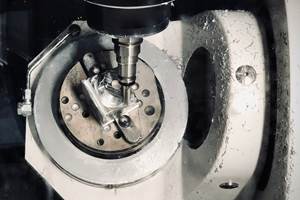Wire, Ram And Small Hole Driller Help Build Specialty Injection Molds
The ram EDM runs unattended day and night, allowing the operators to perform other tasks. The ram has cut graphite costs nearly 50 percent, requiring fewer electrodes than its older equipment.
Share




Quashnick Tool Corp. (San Joaquin Valley, California) builds various injection molds for the automotive, medical, electronics and communications industries. Terry Quashnick opened the company in 1973. Typically, its H-13 and S-7 steel molds demand tolerances to within 0.0001 inch. And since highly accurate plastic parts from telephone headsets to tiny DNA testing components are usually the end-products, the company's moldmaking process requires both highly accurate machine tools and cosmetic artistry.
Also, each mold is unique, with some requiring highly complex shapes from angles and stepped ribs to hot runners. Some don't have a single straight line while others require changes after being built, which must be done on hardened steel.
Recently, Quashnick purchased Sodick's wire, ram and small hole driller EDMs. Sodick's AP500 wire EDM, Mold Maker 3 and K1CS small hole driller EDMs have enabled Quashnick Tool to meet these demands, cut production time, lower costs and increase its output capacity. These EDMs have provided Quashnick Tool with the ability to build molds and tools for its customers in-house without having to send out for specialty parts.
"The computer-generated contours for the plastic parts we produce demand multiple production steps," said Joe Greene, tooling manager. "The outside of one special part called for a teardrop shape with a ribbed shell inside to hold a circuit board. We used the ram EDM for the initial rough cuts, followed by our wire EDM for more intricate cuts and finishing."
A more recent mold was built using 100-percent EDMing. Quashnick Tool produced a prototype laser reaction tube used for human gene testing and research. This job called for a cylindrical body part with six protruding ribs on either side. The ribs required jagged stairstep shapes. A connector was attached that called for an intricate diamond shape inside which had to be mirror polished to reflect light from a laser. Sodick's wire EDM, Mold Maker 3 and K1C small hole driller handled the entire roughing and finishing process.
The ram EDM runs unattended day and night, allowing the operators to perform other tasks. The ram has cut graphite costs nearly 50 percent, requiring fewer electrodes than its older equipment.
Previously, ejector pin holes had to be drilled or reamed out manually and sent out for treatment. Often, they would come back warped, distorted or off-location. Today, after heat-treating the steel, holes are started with the K1CS EDM. Then the AP500 wire EDM is used to finish them quickly and on spec every time.
The company now has more flexibility in its mold building process. The Mold Maker 3 allows it to produce highly intricate, 20- and 30-degree mold cuts—including conical shapes and perfect gates—without having to worry about trapped debris or DC arcing. It orbits inside, around the top and bottom, around angles and gets them right without chips or cracks. Also, four-cavity molds, for example, can be burned in a single operation.
"We also appreciate the C-axis head, which gives us the ability to rotate workpieces at any angle and then reposition the same electrode at other angles for similar burns," Mr. Greene said. "We can run the Sodick EDM overnight and not have to worry about stops, starting over, insert welds and other problems which occasionally occurred on our older EDMs."
The EDMs have given the company the ability to cut complex, highly difficult shaped molds in-house and on-time.
Related Content
The Future of High Feed Milling in Modern Manufacturing
Achieve higher metal removal rates and enhanced predictability with ISCAR’s advanced high-feed milling tools — optimized for today’s competitive global market.
Read MoreCNC Machine Shop Honored for Automation, Machine Monitoring
From cobots to machine monitoring, this Top Shop honoree shows that machining technology is about more than the machine tool.
Read MoreQuick-Change Tool Heads Reduce Setup on Swiss-Type Turning Centers
This new quick-change tooling system enables shops to get more production from their Swiss turning centers through reduced tool setup time and matches the performance of a solid tool.
Read MoreHow to Successfully Adopt Five-Axis Machining
While there are many changes to adopt when moving to five-axis, they all compliment the overall goal of better parts through less operations.
Read MoreRead Next
Setting Up the Building Blocks for a Digital Factory
Woodward Inc. spent over a year developing an API to connect machines to its digital factory. Caron Engineering’s MiConnect has cut most of this process while also granting the shop greater access to machine information.
Read MoreRegistration Now Open for the Precision Machining Technology Show (PMTS) 2025
The precision machining industry’s premier event returns to Cleveland, OH, April 1-3.
Read MoreBuilding Out a Foundation for Student Machinists
Autodesk and Haas have teamed up to produce an introductory course for students that covers the basics of CAD, CAM and CNC while providing them with a portfolio part.
Read More

















.jpg;maxWidth=300;quality=90)
















